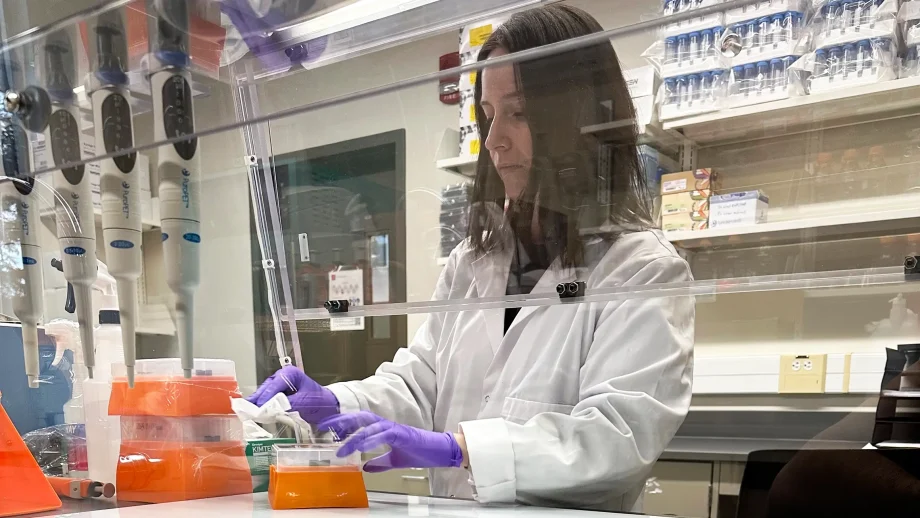
Dr. Melanie Gregg, Dr. Nathan Hall, ©UWinnipeg
WINNIPEG, MB – The results from a large national research project led by the Healthy Active Living and Obesity Research Group (HALO) at the CHEO Research Institute shows about two-thirds of Canadian children haven’t achieved an acceptable level of physical literacy. Physical literacy moves beyond just fitness or motor skill; it includes the motivation, confidence, physical competence, knowledge and understanding to value and take responsibility for engagement in physical activities for life.
UWinnipeg’s Dr. Melanie Gregg and Dr. Nathan Hall, both in kinesiology and applied health, contributed six of the 14 articles that looked at different aspects of physical literacy which were published today in the Canadian Assessment of Physical Literacy (CAPL) as a special supplement in BMC Public Health.
More than 10,000 children, aged eight to 12, from 11 cities across the country participated in the study through the CHEO Research Institute and research partners. Using the CAPL, children were assessed on a number of different areas. Gregg and Hall led the Manitoba data collection included in this project.
“The need for a project of this scale was essential to help establish a clear picture of physical literacy among Canadian children, and subsequently it was important to us that youth from Manitoba were included in this research,” stated Hall.
“Having these benchmarks for physical literacy are a critical first step to assessing whether the changes that are implemented in Manitoba and at the national level are doing what they’re supposed to – getting Canadians to move more, more often,” Gregg added.
The results demonstrate that more needs to be done to ensure Canadian children are physically literate.
“We hear about increasing obesity rates in kids, falling rates of physical activity and more time spent in front of screens,” said Dr. Mark Tremblay, senior scientist at the CHEO Research Institute and director for HALO. “Physical literacy looks at different domains in children to give a better overall picture of children’s healthy active living and future health. Physically literate children become more active and healthy children, which sets them up for life.”
The HALO Research Group has been developing and refining the CAPL for the past 10 years. It’s a robust tool that is valid, reliable, and feasible, and is being used across the country and internationally. The results of this research provide the first comprehensive assessment of the physical literacy of Canadian children.
“Through this project, we provide comprehensive evidence that Canadian children, aged eight to 12 years, are falling short of standards for components of physical literacy,” Tremblay said. “For example, boys and girls across Canada have aerobic fitness levels at the 30th percentile of global norms and only 20 per cent are meeting physical activity guidelines.”
“These results show us that more needs to be done,” continued Tremblay. “Every organization concerned with the well-being of children, whether provincial governments, municipal public health and recreation departments, boards of education, and sports or recreation groups, should allocate increased resources to increase children’s physical literacy. Additional education campaigns, greater priority in school curricula, and increased numbers of physical education specialists could have a real impact in the health of Canada’s children.”
Findings from this project have led to further refinements of the Canadian Assessment of Physical Literacy and the release of the second edition of the Canadian Assessment of Physical Literacy, or CAPL-2.
“Ensuring that we have the right tools for coaches, educators, and parents is an important way to increase physical literacy in Canada,” said Pat Longmuir, scientist with the CHEO Research Institute, HALO Research Group. “The CAPL-2 is a shorter, easier to administer series of tests that can be used to assess and monitor physical literacy in Canada. The materials are available in both English and French, free of charge at www.capl.eclp.ca.”
BMC Public Health is an open access, peer-reviewed journal that considers articles on the epidemiology of disease and the understanding of all aspects of public health. The journal has a special focus on the social determinants of health, the environmental, behavioral, and occupational correlates of health and disease, and the impact of health policies, practices and interventions on the community.
This research study was made possible in part with support from the RBC Learn to Play Project, an initiative funded by RBC and the Public Health Agency of Canada, and delivered in partnership with ParticipACTION, with additional support from Mitacs.




